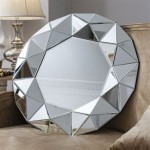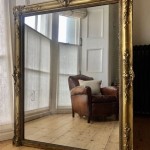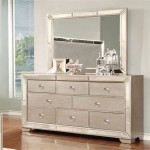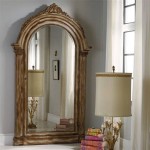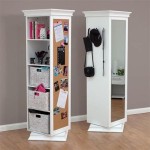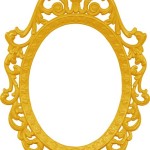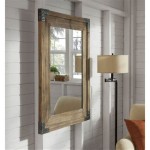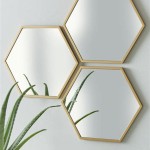Framing a Mirror Ideas
Framing a mirror elevates its aesthetic appeal, transforming it from a functional object to a decorative piece. A well-chosen frame can complement existing decor, enhance the mirror's size and shape, and even influence the perceived light and space within a room. This article explores various framing ideas to inspire and guide your next mirror project.
Simple and Classic Frames
For a timeless and versatile look, consider classic frame styles. These options readily complement various decor styles and offer a clean, understated elegance.
*Thin Metal Frames:
Sleek and minimalist, thin metal frames in finishes like brushed silver, gold, or black add a touch of sophistication without overpowering the mirror. *Plain Wooden Frames:
Natural wood frames provide warmth and texture. Choose from a variety of wood types and finishes to match existing furniture or create a focal point. *Simple Beveled Frames:
A subtle bevel adds dimension and visual interest to a plain frame, offering a classic look suitable for traditional or contemporary settings.Adding Decorative Flair
Decorative frames can significantly enhance the visual impact of a mirror, adding personality and style to a space. These frames often incorporate intricate details and embellishments.
*Ornate Carved Frames:
Elaborately carved wood or resin frames create a dramatic and luxurious statement, particularly suited for traditional or vintage-inspired interiors. *Gilded Frames:
Gold or silver leaf gilding adds opulence and grandeur, instantly elevating a mirror to a focal point. *Mosaic Frames:
Mosaic frames, crafted from tiles, glass, or other materials, introduce vibrant color, pattern, and texture, making a bold artistic statement. *Repurposed Material Frames:
Using repurposed materials like old picture frames, reclaimed wood, or even seashells offers a unique and eco-friendly framing solution.Framing for Different Mirror Shapes
The shape of the mirror plays a crucial role in determining the appropriate frame style. Consider the following suggestions for different mirror shapes:
*Round Mirrors:
Thin frames or decorative frames with circular motifs often complement round mirrors, enhancing their soft and graceful silhouette. *Rectangular and Square Mirrors:
These versatile shapes can accommodate a wide range of frame styles, from simple and classic to ornate and decorative. *Oval and Arch-Top Mirrors:
Frames that echo the curved lines of oval or arch-top mirrors create a harmonious and balanced look. Consider frames with decorative accents at the top or along the curves.Framing Oversized Mirrors
Framing oversized mirrors requires careful consideration to avoid overwhelming the space. The frame should complement the mirror's size without competing for attention.
*Simple, Wide Frames:
A simple, wide frame in a neutral color can provide a balanced border for an oversized mirror, anchoring it within the room. *Subtle Decorative Elements:
Consider adding subtle decorative elements to a wide frame, such as a textured finish or a discreet pattern, to enhance visual interest without overpowering the mirror's scale.Creating a Frameless Look
For a contemporary and minimalist aesthetic, consider creating a frameless look for your mirror. This approach emphasizes the reflective surface and creates a seamless integration with the wall.
*Beveled Edges:
A beveled edge on the mirror itself creates a subtle frame-like border, adding a touch of elegance without the need for a traditional frame. *Polished Edges:
Highly polished edges on a frameless mirror provide a clean and refined look, allowing the mirror to blend seamlessly with the surrounding wall.Framing for Specific Rooms
The function and style of a room should influence the choice of mirror frame. Consider the following room-specific suggestions:
*Bathrooms:
Moisture-resistant materials like metal or treated wood are essential for bathroom frames. Simple, sleek designs or frames with nautical themes often complement bathroom decor. *Bedrooms:
Ornate frames, gilded finishes, or frames incorporating soft textures like fabric or velvet can add a touch of elegance and luxury to a bedroom. *Living Rooms and Dining Rooms:
The frame choice for these spaces depends on the overall decor style. Consider classic wooden frames, decorative metal frames, or frames that complement existing artwork and furniture.DIY Framing Ideas
Creating a custom frame for your mirror offers a unique and personalized touch. DIY framing allows for creative expression and can be a cost-effective alternative to purchasing a pre-made frame.
*Repurposed Materials:
Transform old picture frames, molding scraps, or even natural elements like branches or driftwood into unique mirror frames. *Mosaic Tiles:
Create a vibrant and personalized frame by applying mosaic tiles to a plain frame or directly onto the mirror's edge. *Painted Designs:
Add a personal touch by painting designs or patterns onto a plain wooden frame.Enhancing the Framed Mirror
Once the mirror is framed, consider additional elements to further enhance its visual impact and functionality.
*Lighting:
Installing sconces or other lighting fixtures around the framed mirror can improve visibility and create a focal point within the room. *Shelving:
Adding a small shelf below a framed mirror provides a practical space for displaying decorative objects or toiletries in a bathroom setting. *Grouping with Other Decor:
Grouping a framed mirror with artwork, photographs, or other decorative elements can create a visually appealing and cohesive display.
How To Frame A Mirror

Mirror Frame Diy How To Update A Basic Bathroom Our Faux Farmhouse

How To Frame Out That Builder Basic Bathroom Mirror For 20 Or Less Design Mirrors Diy

Diy Stick On Mirror Frame Sawdust Sisters

30 Diy Mirror Frames Scratch And Stitch
:max_bytes(150000):strip_icc()/bloomingdiyer-372b1cae2a6c43af917f3bea506c11da.jpg?strip=all)
20 Diy Mirror Frame Ideas To Inspire Your Next Project
:max_bytes(150000):strip_icc()/kaylasimonehome-905941da7dd04a08af07c415df2a1fd8.jpeg?strip=all)
20 Diy Mirror Frame Ideas To Inspire Your Next Project

10 Diy Ideas For How To Frame That Basic Bathroom Mirror

How To Frame A Bathroom Mirror

8 Amazing Bathroom Mirror Ideas Diy Update

